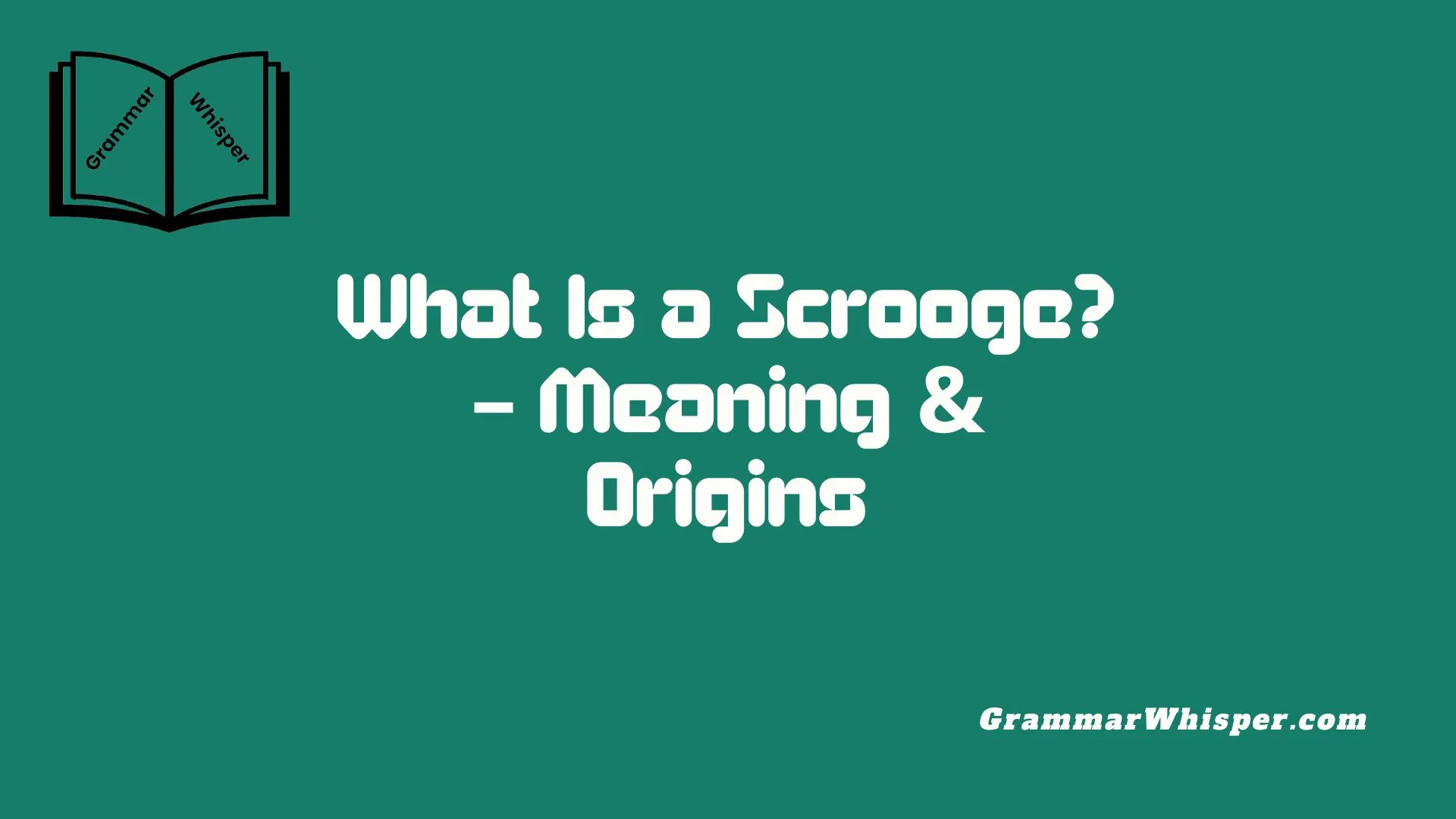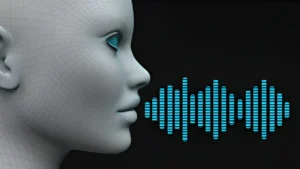Don’t be such a Scrooge – we’ve all heard it maybe more than once, especially during the holidays or those times when someone quietly refuses to chip in for a group gift. But where does this quirky term actually come from, and why has it become such a powerful label for stinginess, coldness, and a lack of festive spirit? As a language lover, I’ve always found it fascinating how one fictional miser turned into a word we toss around every December.
This post dives deep into the meaning, tracing its literary origins back to Dickens and showing its unexpected transformation into a universal cultural reference. I’ve even caught myself calling a friend a Scrooge once when he wouldn’t split the dinner bill – it’s funny how it’s still used today with such colorful richness and context. If you ever wondered what makes this word stick, you just need to understand its story and how to use it fully – trust me, it says a lot more than just “cheap!”
Meaning of “Scrooge”
The word “Scrooge” is widely used today to describe a person who is:
- Miserly
- Ungenerous
- Grumpy or emotionally cold
- Opposed to spending money or sharing joy
According to Merriam-Webster, a Scrooge is defined as:
“A miserly person.”
The Cambridge Dictionary adds:
“Someone who spends as little money as possible and is not generous.”
But modern usage has expanded beyond financial stinginess. Today, if you’re called a Scrooge, it can also mean:
- You’re being emotionally stingy
- You lack holiday cheer
- You’re resistant to change or lack empathy
In short, Scrooge is no longer just a name – it’s an entire personality archetype.
Origin and Historical Context of Scrooge
The name “Scrooge” originated from Charles Dickens’ 1843 novella A Christmas Carol. The character Ebenezer Scrooge is arguably one of literature’s most famous misers.
But Dickens didn’t just pull the name out of thin air. There’s some debate among scholars about the etymology:
- Dickens was known for inventing surnames based on how they sounded. “Scrooge” evokes “screw” (tight) and “grouch.”
- Some believe he drew inspiration from a real-life London merchant named Ebenezer Scroggie, whom Dickens once saw referred to on a gravestone as a “mean man.” He misread it as “mean” in character rather than “meal man” (a grain merchant).
Victorian England and Its Influence
To understand Scrooge, you need to understand the social climate of 19th-century England:
- The Industrial Revolution was booming, but the working class suffered.
- Dickens wrote A Christmas Carol as a moral critique of capitalist greed.
- Ebenezer Scrooge embodied the harsh, profit-driven elite who ignored poverty.
So, Scrooge wasn’t just a fictional miser – he was a direct critique of social inequality and apathy.
Ebenezer Scrooge from A Christmas Carol
Ebenezer Scrooge begins the story as a cold-hearted, greedy, joyless old man. He detests:
- Christmas
- Charity
- Family gatherings
- Spending money
He’s the boss who won’t give his employee Bob Cratchit a day off. He says things like:
“If they would rather die… they had better do it, and decrease the surplus population.”
Key Traits of Scrooge’s Character:
| Trait | Example from the Book |
| Miserliness | Refuses to heat his office to save money |
| Emotional Detachment | Shows no empathy for Cratchit’s sick child, Tiny Tim |
| Loneliness | Eats alone, avoids social contact |
| Cynicism | Calls Christmas “a poor excuse for picking a man’s pocket” |
Scrooge is not just tight with money – he’s cut off from human connection. His heart is frozen, much like the snowy streets outside his London office.
The Transformation of Scrooge
One of the most powerful parts of A Christmas Carol – and what has kept the story alive for nearly two centuries – is Scrooge’s transformation.
He’s visited by:
- The Ghost of Christmas Past – Reminds him of his lonely childhood and lost love.
- The Ghost of Christmas Present – Shows how others celebrate with joy and compassion.
- The Ghost of Christmas Yet to Come – Reveals a future where he dies alone and unloved.
Turning Point:
After these visions, Scrooge repents deeply, realizing how far he’s strayed from human decency.
“I will honor Christmas in my heart, and try to keep it all the year.”
His change isn’t just about generosity – it’s about becoming emotionally alive again.
Scrooge in Modern Language
The name “Scrooge” has leapt from fiction into everyday conversation. In modern usage, it’s used as:
- A nickname for someone cheap or emotionally distant.
- A seasonal jab during the holidays (e.g., “Don’t be a Scrooge – come caroling!”)
- A cultural shorthand for anyone who is anti-joy, anti-generosity, or anti-fun.
Usage Examples:
- “He wouldn’t even tip the delivery guy. Total Scrooge move.”
- “My boss is a Scrooge – won’t even give us Christmas Eve off.”
- “Don’t be a Scrooge, just try to enjoy the party!”
Scrooge Synonyms and Related Terms
While Scrooge is unique, it shares overlap with other terms for stingy or joyless people.
Table: Scrooge vs. Similar Terms
| Term | Meaning | Tone |
| Miser | Hoards money, spends as little as possible | Neutral/Descriptive |
| Cheapskate | Informal for someone who avoids spending | Negative/Playful |
| Tightwad | Extremely frugal person | Negative |
| Curmudgeon | Bad-tempered, often old | Amused/Endearing |
| Grinch | Spoils fun or joy, especially at Christmas | Pop Culture/Playful |
Scrooge combines miserliness, emotional coldness, and holiday negativity – making it a more layered term than most synonyms.
Scrooge in Media, Pop Culture & Literature
Over the decades, Scrooge has appeared in countless forms across media:
Film Adaptations
| Title | Actor/Voice | Year | Notable For |
| Scrooge | Alastair Sim | 1951 | Classic black-and-white adaptation |
| A Christmas Carol (animated) | Jim Carrey | 2009 | CGI rendition by Disney |
| Scrooged | Bill Murray | 1988 | Modern satire with a TV exec as Scrooge |
| The Muppet Christmas Carol | Michael Caine | 1992 | Family-friendly and widely loved |
TV & Cartoons
- Scrooge McDuck: Disney’s Scottish billionaire duck, inspired by Ebenezer Scrooge. Ironically adventurous and philanthropic – but still frugal.
- The Simpsons: Mr. Burns echoes Scrooge’s elitism and apathy.
- Saturday Night Live: Often parodied during holiday specials.
Literary and Cultural Echoes
- Modern novels and stories often use “Scrooge” types as shorthand for redemption arcs or critiques of capitalism.
Scrooge as a Cultural Archetype
Scrooge isn’t just a character – he’s an archetype that recurs throughout media and society.
Traits of the Scrooge Archetype:
- Emotionally guarded
- Wealthy but isolated
- Resistant to change
- Eventually transformed (optional)
This archetype is useful for:
- Satirizing the wealthy elite
- Exploring themes of emotional repression
- Representing the “too late to change” fear many people have
Scrooge in Global Contexts
While Scrooge is English, the concept of a stingy or joyless figure is universal.
Global Variants:
| Culture | Equivalent Figure | Notes |
| French | Harpagon (The Miser by Molière) | Obsessive about money, controls family |
| Russian | Plyushkin (Dead Souls by Gogol) | Hoards useless things out of fear |
| Japanese | Kanjo-bukai ojisan (“tight old man”) | Common trope in manga/anime |
| German | Geizhals (cheapskate) | Often used in satire |
These characters often reflect cultural anxieties about money, aging, and human connection.
Examples of “Scrooge” in Sentences
Here are real-life sentence uses in varied contexts:
Formal:
- “The company CEO, once labeled a Scrooge by critics, has since pledged 10% of profits to charity.”
Casual:
- “You didn’t buy coffee again? You’re turning into such a Scrooge.”
Humorous:
- “I told my cat Santa wasn’t real and she gave me that ‘Scrooge energy’ stare.”
Psychological and Philosophical Interpretations
Scrooge’s character arc can be viewed through multiple lenses:
Psychological:
- Attachment Issues: Childhood trauma and loneliness shaped his emotional coldness.
- Fear of Vulnerability: Hiding behind money to avoid human connection.
Philosophical:
- Existentialism: Confrontation with mortality sparks meaning-making.
- Redemption Theory: No one is too far gone to change.
Scrooge’s story reminds us that even the hardest heart can thaw.
The Legacy of Scrooge
So, why has Scrooge endured for nearly 200 years?
- Relatable Flaws: We all fear becoming disconnected, bitter, or regretful.
- Hopeful Message: Redemption is always possible, no matter your age or past.
- Cultural Utility: “Scrooge” is a linguistic Swiss army knife – it works in jokes, critiques, stories, and slogans.
His story isn’t just about Christmas. It’s about empathy, change, and the power of human connection.
Conclusion
Scrooge started as a fictional character in a Christmas tale but has become a universal symbol – of what we fear becoming, and what we hope to overcome. Calling someone a “Scrooge” is more than just a holiday insult – it’s a call to look inward.
Whether you’re reflecting on a tough year, rethinking your generosity, or simply trying to explain why your uncle won’t turn on the heat – the term Scrooge carries rich meaning.
And the next time you hear “Don’t be a Scrooge,” maybe it’s not just about spending money – maybe it’s about opening your heart.
FAQs
What does it mean to call someone a Scrooge?
Calling someone a Scrooge usually means they’re being stingy, unkind, or lacking in holiday or emotional spirit. The term comes from Ebenezer Scrooge, the cold and miserly main character in A Christmas Carol by Charles Dickens. Today, it can refer to anyone who avoids generosity, fun, or human connection.
Is Scrooge based on a real person?
While Ebenezer Scrooge is a fictional character, some believe Charles Dickens was inspired by a real 19th-century Scottish merchant named Ebenezer Scroggie, whose gravestone read “A mean man” (meaning “meal man” or grain dealer). Dickens may have misread this, leading to the creation of Scrooge’s name and persona.
What is the difference between a miser and a Scrooge?
A miser is strictly someone who hoards money and refuses to spend it, while a Scrooge embodies more than just financial stinginess. Scrooge represents emotional coldness, lack of empathy, and resistance to joy – especially during the holiday season. So, while all Scrooges are misers, not all misers are full Scrooges.
Why is Scrooge important in literature and culture?
Scrooge is one of the most iconic literary characters representing redemption. His transformation from a heartless miser to a generous, joyful man is a powerful symbol of change, compassion, and second chances. Over time, his name has become shorthand for anyone who rejects warmth, generosity, or holiday spirit.
What is the modern equivalent of a Scrooge?
In modern culture, someone might be called a Grinch, tightwad, or cheapskate in place of Scrooge, depending on the tone. In pop culture, characters like Mr. Burns from The Simpsons or Scrooge McDuck in Disney cartoons echo the archetype. These figures often reflect similar traits: wealth, isolation, and a resistance to joy.











